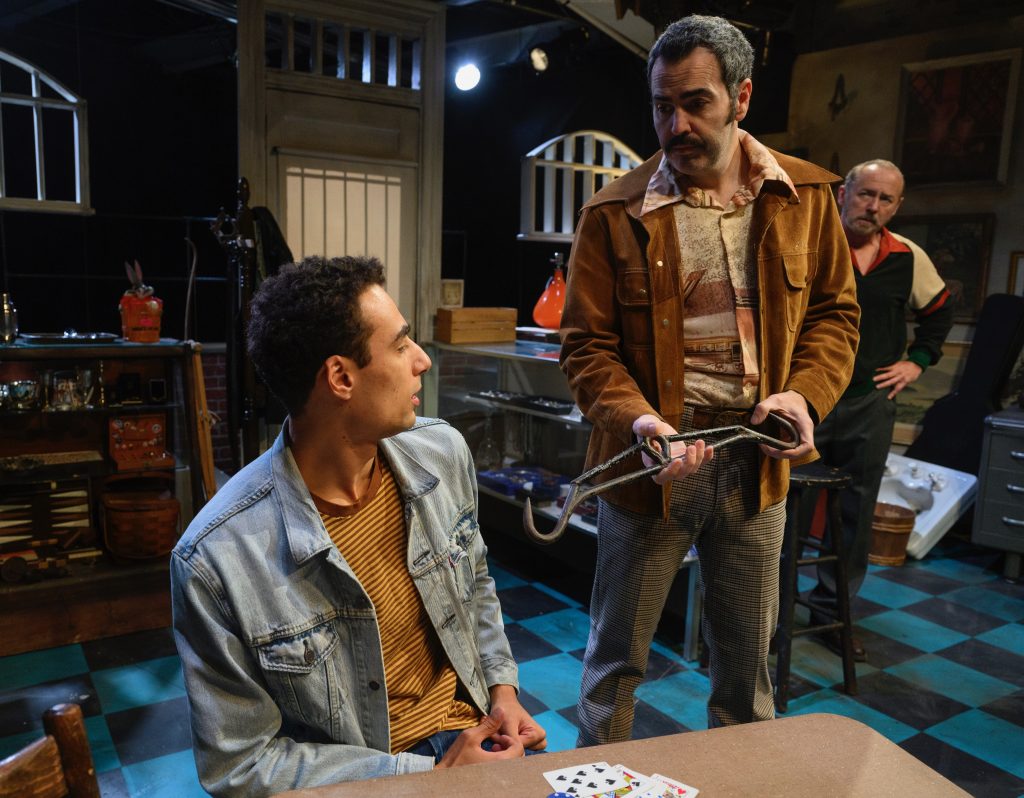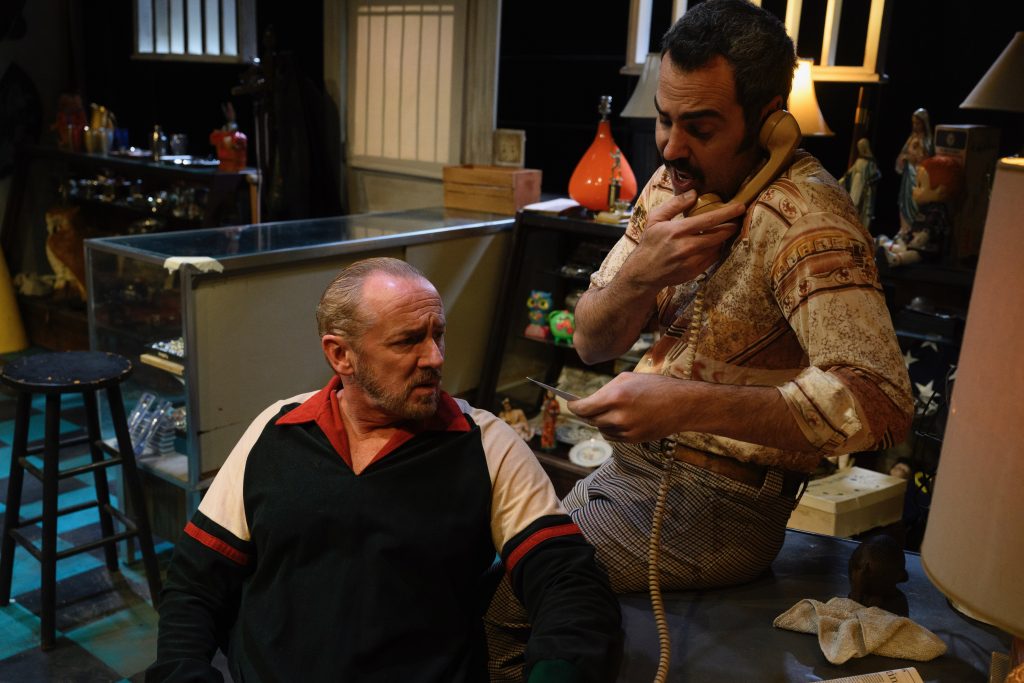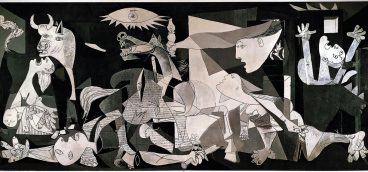Barebones’ “American Buffalo” is Stunning and Revelatory Theater

In trying to describe the essence of strong writing – and ultimately, all art — the poet Wallace Stevens said, “A grandiose subject is not an assurance of a grandiose effect, but most likely, the opposite.” What we have in David Mamet’s “American Buffalo” (1975) is the embodiment of this ethos, as the play brings us into the lives of three of the most mundane people imaginable. Barebones Productions’ presentation of this tragicomic story is a masterful synergy of direction, acting, and set design, and succeeds on a scale rarely achieved in these days of moralistic, didactic, and yes, grandiose theater.
This is a large play set in a small room and, with the audience so close to the performance area in Barebones’ black box setting, an undertaking of immense risk, as there is no filter of distance or elevation — such as in a normal proscenium theater — to mitigate the slightest nuance of flaw.
Hence the acting is more film-like than theatrical; each moment a close-up evocation that feels almost obscene in its intensity. We are in the personal space of these characters, as if we’re watching their minute lives amplified through the magnified lens of terrarium glass. This is a good thing if the acting is good; if not, it could be horrible, but director Melissa Martin uses it as a virtuosic gamble that pays off with such an accomplished cast. The performances are so smoothly integrated that you can’t believe you’re watching one prolonged take — let alone one this polished on an opening night – and you have to keep reminding yourself that this is live, not a film recorded and edited together to achieve such a seamless fluidity.
And fluidity may be the key trope of this show. One theatergoer, prior to the start, opined that “Mamet is a percussive writer,” but I saw no evidence of this. If his dialogue is percussive then these actors played it with brushes, not drumsticks. I think rhythmic is the more appropriate word for what Mamet does, and Barebones portrays.

Much of the play is a pas de deux between junkshop owner Donny (David Whalen), and his scheming, loser-buddy Teach (Patrick Jordan). Whalen and Jordan are so in synch and so off book that they talk like old friends who know what the other is about to say, but still listen to one another because they realize that no one else wants to. They don’t speak like actors, or “characters,” or – most important – like playwright Mamet. They speak from within themselves, perhaps one of the hardest things to accomplish on stage, especially when dealing with material written by such a pronounced stylist. When one can take the language of a stylist – whether a Mamet, Williams, or Shakespeare — and make it one’s own, the performance enters that elevated plane of the extraordinary, as this one does.
The third character, Bobby (Brenden Peifer) is a young junky who may still be strung out, and who acts as a counterpoint to the other two. There is an innocence to Peifer’s vacuity, an unabashed lack of tendentiousness that feels more like the actor holding back his professional intelligence, rather than trying to impress us with it, as a less evolved thespian might. He keeps us – and Donny and Teach – guessing as to whether he is just a junky trying to constantly touch his friends for 50 bucks, or is he really up to a more nefarious scheme of his own, as they try to stage a petty heist to steal a Buffalo nickel from an unsuspecting patron of their shop.
Director Martin’s pacing is taut — divided into two 45-minute acts — which again honors Mamet’s driving flow and is faithful to the playscript. This is smooth jazz, not bebop – at least until the climax, when the ride cymbal comes crashing down.
Tony Ferrieri’s set is as much of a character as its human inhabitants, and the deliquescence of its junk shop intricacy – stuffed with glass display cases, tables, chairs, boxes, trunks, paintings, and every manner of bric-a-brac known to man – imbues a sense of infinity to the cheapness of the lives we witness. Nothing is worth more than two dollars. At one point, surveying the million nugatory things surrounding them, Teach declares, as if delivering a profound epiphany, “If I had all the shit I’d thrown out I’d be a wealthy man.” But what he doesn’t realize is that he is living in all the shit he’s thrown out, and it adds up to nothing. To admit that would be existential suicide. At the end, when Donny puts on one of the coats hanging on the rack in his shop he literally becomes a piece of the junk he is selling. The moment is made all the more pathetic because he doesn’t realize it, either.
Donny, who owns the shop, can’t leave it – it’s young Bobby’s job to run out for coffee and food – much like those characters in a Samuel Beckett play who can never leave the setting. And you can see the influence of “Waiting for Godot” on this one: also a two-act play in which nothing happens (twice), based on two guys and a kid (the latter who acts as a messenger), while they wait for another character (in this case, Fletcher) who never arrives.

Whalen and Jordan have that rarefied chemistry you find in exceptionally acted “buddy” films, like Peter Falk and John Cassavetes in “Mikey and Nicky,” where there are always two layers being explored: the deep layer of friendship, and the equally pregnant layer of subterfuge. That these layers are not distinct or quantifiable is the key to such superb acting. It’s as if they know each other better than the script allows. In their most sublime moments together, Whalen and Jordan exhibit a kind of Buster Keaton-esque insouciance; their syncopation in the phone scene when they try to call the house of the man they intend to rob is scintillating in its comic timing.
Whalen’s evocation of the feckless Donny is so intrinsic, unaffected, and unadorned it makes you feel sorry for all the losers in the world. He’s not the kind of heroic loser you hear about in Steely Dan songs — sad souls glorified by unfulfilled dreams. What makes Donny tragic is that he doesn’t even know he’s a loser. Whalen’s brilliance lies in giving Donny no irony. He’s utterly naïve, not realizing when he’s been cheated by Fletcher in cards, duped by Bobby’s running of false errands, and most important, not seeing his shop – buried as he is in junk — as his grave.
This is all much harder than playing him as a fool for laughs. The core of Donny’s pathos stems from how effectively Whalen hides it from his character’s own recognition. Whalen shows us Donny’s soul by keeping it hidden from himself.
I used the term tragicomedy at the beginning to describe this production, because while these are indeed tragic lives, they are also farcical, in that the characters, like true clowns, never move the action forward. Of the three, Jordan’s Teach is the most variegated in this sense, swinging from brooding frustration, “The only way to teach these people is to kill them,” to unintentional humor, “Yes, I’m usually the one according to when I’m talking.”
Jordan nails this wavering ethos between these two extremes: his Teach is the guy in shop class who thought he was a player, but then, as now, wears passé clothing and cheesy facial hair, the kind of guy who knew more about cars than women but always confused the two. He’s a Stanley Kowalski transmogrified by the 1970s, who thinks too much without the brain power to process what’s he’s thinking, like an overheated computer circuit board. Jordan never telegraphs his character’s intentions; Teach’s outbursts erupt as they would in a person befuddled by the inability to grasp his own interiority, which make his mood swings all the more convincing. He never oversells this character’s inherent obtuseness. It’s an unfolding revelation that both amuses and shocks us.
There’s a tendency – in less evolved productions of this play – to treat the rampant vulgarity, such as all the F-bombs and C-words, as a sort of lewd drumbeat (back to the misguided theory of Mamet’s “percussive” text). But to the credit of the director and actors, this language is really just persiflage, used as connective tissue, not something to be flaunted. It’s much more effective in its matter-of-factness than it would be in in the service of a histrionic, and thereby, grandiose effect, as Wallace Stevens has warned us.
Special credit should be given to stage manager Claire Durr, whose artful and painstaking assemblage of the set — not just initially, but show after show due to the explosive climax — is almost beyond comprehension. Her work, in conjunction with Tony Ferrieri’s design, and Rikkee Lee Rose’s prop management, makes the conceptual art installations at the recent Carnegie International look silly by comparison.
Andrew Michel’s sound work is appropriately subtle, and the musical interludes are wryly chosen, especially the soundtrack from “Midnight Run,” another classic buddy film – in which one of the characters, like Teach, does not have a working watch — while the closing piece, “Life in the Fast Lane,” is ironically hilarious. And Andrew David Ostrowski’s lighting puts us firmly in the diurnal and nocturnal states the action requires.
I suspect all strong playwrights want to hear their work delivered by strong, interpretative actors, regardless of how stylistic they try to be. And ultimately, this production by Barebones offers the greatest possible homage to Mamet, as the dialogue flows from the characters, not the playscript. That these actors make this seem so easy is extraordinary and creates the kind of revelatory theatrical experience that you will rarely see.
AMERICAN BUFFALO continues through December 10th at the Barebones Black Box Theater, 1211 Braddock Ave., Braddock. $40-50. www.barebonesproductions.com














